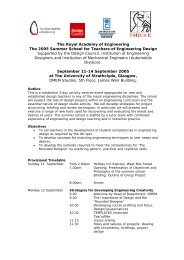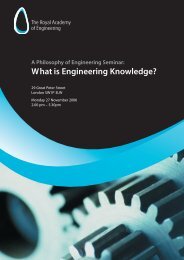Engineering Ethics: Do engineers owe duties to the
Engineering Ethics: Do engineers owe duties to the
Engineering Ethics: Do engineers owe duties to the
You also want an ePaper? Increase the reach of your titles
YUMPU automatically turns print PDFs into web optimized ePapers that Google loves.
The Lloyd’s Register Lecture<br />
Lord Justice Salmon commented that <strong>the</strong> argument (for <strong>the</strong> Plaintiff) that <strong>the</strong> press was not <strong>the</strong> proper<br />
authority for <strong>the</strong> receipt of confidential information:<br />
"raises questions of great importance with far reaching consequences about which <strong>the</strong>re is very little<br />
relevant authority. I think that it would be quite impossible <strong>to</strong> strike out a defence on <strong>the</strong> narrow ground<br />
that, although <strong>the</strong>re is an exception in this case, <strong>the</strong> exception does not avail <strong>the</strong> Defendant because he<br />
went <strong>to</strong> <strong>the</strong> wrong person <strong>to</strong> disclose <strong>the</strong> information".<br />
There is ample scope for <strong>the</strong> application of <strong>the</strong> doctrine <strong>to</strong> issues of health and safety and <strong>to</strong><br />
environmental issues arising under construction contracts, where Engineers are involved both in <strong>the</strong><br />
performance and <strong>the</strong> supervision and approval of <strong>the</strong> work. It is clear that <strong>the</strong> Courts would not directly<br />
enforce an obligation under a contract which has <strong>the</strong> effect of contravening health and safety law or<br />
environment law. There may be difficulty in drawing a distinction between contracts which necessarily<br />
involve illegality and those which only permit performance in an illegal manner. The point is illustrated<br />
by <strong>the</strong> leading case of St. John Shipping Corporation v Joseph Rank 28 in which cargo owners resisted a claim<br />
for <strong>the</strong> payment of freight on <strong>the</strong> ground that <strong>the</strong> carriers had illegally overloaded <strong>the</strong> ship. Although this<br />
amounted <strong>to</strong> a statu<strong>to</strong>ry offence, Devlin J held that <strong>the</strong> legality of <strong>the</strong> contract was unaffected and that <strong>the</strong><br />
statute 29 prohibited merely <strong>the</strong> act and not <strong>the</strong> contract under which <strong>the</strong> act was done. Under<br />
construction contracts, h<strong>owe</strong>ver, much more complex situations may arise. What is <strong>the</strong> position when an<br />
unforeseen safety risk becomes apparent and <strong>the</strong> removal of this risk requires <strong>the</strong> re-execution of<br />
o<strong>the</strong>rwise satisfac<strong>to</strong>ry work? The question of payment and legal liability will ultimately be resolved by<br />
legal process. 30 But <strong>the</strong> ethical issues arising in <strong>the</strong> course of finding a solution are complex, and fur<strong>the</strong>r<br />
illustrated by some of <strong>the</strong> examples which follow.<br />
Duties arising in <strong>to</strong>rt<br />
The law of <strong>to</strong>rt renders certain conduct actionable by persons who suffer loss. All Engineers may <strong>owe</strong><br />
<strong>duties</strong> under <strong>the</strong> law of <strong>to</strong>rt, or more precisely in <strong>the</strong> present context, under <strong>the</strong> law of <strong>to</strong>rtious<br />
negligence. Given that <strong>the</strong> law of contract operates only where an agreement can be identified or inferred,<br />
it is of particular relevance <strong>to</strong> inquire whe<strong>the</strong>r <strong>the</strong> law of <strong>to</strong>rt supports <strong>the</strong> existence of a wider duty <strong>to</strong> <strong>the</strong><br />
public. The law operates <strong>to</strong> impose a duty of care as between individuals who are in a sufficient state of<br />
proximity such that, in <strong>the</strong> reasonable contemplation of one person, his negligent act may be likely <strong>to</strong><br />
cause damage <strong>to</strong> <strong>the</strong> o<strong>the</strong>r. This branch of English law started quietly in 1932 with <strong>the</strong> celebrated speech<br />
of Lord Atkin in which <strong>the</strong> rule that you are <strong>to</strong> love your neighbour was first translated in<strong>to</strong> legal terms. 31<br />
The law remained largely undisturbed until a sudden development in 1972 32 led <strong>to</strong> a series of landmark<br />
cases in which <strong>the</strong> House of Lords were compelled <strong>to</strong> examine <strong>the</strong> roots of every element in <strong>the</strong> concept<br />
of <strong>to</strong>rtious negligence, particularly those concerning proximity, duty and damage. At its zenith, <strong>the</strong> law of<br />
negligence seemed entirely <strong>to</strong> supersede <strong>the</strong> law of contract. 33 Yet over <strong>the</strong> next eight years <strong>the</strong> House of<br />
Lords doubted and <strong>the</strong>n reversed its previous decision, 34 firmly but not entirely closing <strong>the</strong> floodgates.<br />
What is left is potential liability <strong>to</strong> some individuals in some circumstances for particular elements of <strong>the</strong>ir<br />
damage, plainly falling well short of a general duty <strong>to</strong> <strong>the</strong> public.<br />
In <strong>the</strong> case of Engineers, h<strong>owe</strong>ver, <strong>the</strong>ir <strong>to</strong>rtious liability has throughout been grafted on<strong>to</strong> a different<br />
s<strong>to</strong>ck 35 in which, in particular, <strong>the</strong> ability <strong>to</strong> recover purely economic loss as opposed <strong>to</strong> loss consequent<br />
on physical damage, has never been a relevant barrier. The liability of those tendering advice is viewed on<br />
an analogous footing <strong>to</strong> advice given pursuant <strong>to</strong> contract where <strong>the</strong> Courts seem <strong>to</strong> regard <strong>the</strong> existence<br />
of a contract and its parties as almost immaterial. The result is that Engineers will be held <strong>to</strong> account for<br />
28 [1957] 1 QB 267.<br />
29 Merchant Shipping (Safety and Load Line Conventions) Act 1932.<br />
30 See Townsend v Cinema News [1958] 20 BLR 118 and generally Keating on Building Contracts para. 6-62, 62A.<br />
31 <strong>Do</strong>noghue v Stevenson [1932] AC 562.<br />
32 Dut<strong>to</strong>n v Bognor Regis UDC [1972] 1 QB 373.<br />
33 Junior Books v Veitchi [1983] AC 520.<br />
34 Murphy v Brentwood DC [1991] 1 AC 398.<br />
35 Hedley Byrne v Heller [1964] AC 465.<br />
10 The Royal Academy of <strong>Engineering</strong>

















